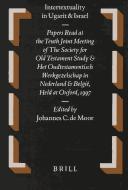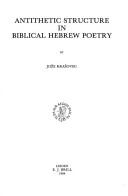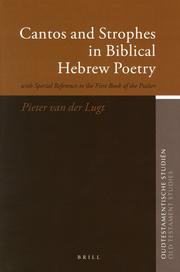| Listing 1 - 7 of 7 |
Sort by
|
Book
ISBN: 0520008685 9780520008687 Year: 1975 Publisher: Berkeley, CA ; Los Angeles, CA : University of California Press,
Abstract | Keywords | Export | Availability | Bookmark
 Loading...
Loading...Choose an application
- Reference Manager
- EndNote
- RefWorks (Direct export to RefWorks)
Book
Year: 1911 Publisher: Paris : Mercure de France,
Abstract | Keywords | Export | Availability | Bookmark
 Loading...
Loading...Choose an application
- Reference Manager
- EndNote
- RefWorks (Direct export to RefWorks)
Poesie hebraique moderne --- Poesie lyrique --- Poesie hebraique moderne --- Poesie lyrique
Book
Year: 1963 Publisher: Chicago : University of Chicago Press,
Abstract | Keywords | Export | Availability | Bookmark
 Loading...
Loading...Choose an application
- Reference Manager
- EndNote
- RefWorks (Direct export to RefWorks)
Poésie hébraïque biblique --- Histoire et critique --- Poésie hébraïque biblique --- Histoire et critique

ISSN: 01697226 ISBN: 9004109137 900449765X 9789004109131 9789004497658 Year: 1999 Volume: 39 Publisher: Leiden Boston : E. J. Brill,
Abstract | Keywords | Export | Availability | Bookmark
 Loading...
Loading...Choose an application
- Reference Manager
- EndNote
- RefWorks (Direct export to RefWorks)
This book deals with the so-called "Blessing of Jacob" (Genesis 49) in all its aspects, discussing philological, literary and historical problems. After an introductory chapter a thoroughly discussed translation of Genesis 49 and an analysis of its poetical structure are presented, followed by the discussion of the genre-definition "tribal saying" ( Stammesspruch ), and a synchronic and diachronic analysis of Genesis 49 in its literary context (Gen. 47:29-49:33). The remarkable results of this analysis are finally discussed in relation to Israel's history. It is suggested that only part of the "Blessing" functioned within the (originally much shorter) deathbed account (Gen. 47:29-49:33*), reflecting the historical situation of the time of origin. Afterwards it was thoroughly worked up into its present shape to meet the conditions of later political development.
Bible --- Criticism, interpretation, etc --- 222.2 --- Genesis --- Bible. --- Criticism, interpretation, etc. --- Exegesis --- Bible. A.T.. Genèse --- Poésie hébraïque biblique --- 49 --- Critique, interprétation, etc. --- Critique de la forme

ISBN: 9004072446 9004275584 9789004072442 Year: 1984 Volume: v. 35
Abstract | Keywords | Export | Availability | Bookmark
 Loading...
Loading...Choose an application
- Reference Manager
- EndNote
- RefWorks (Direct export to RefWorks)
Hebrew poetry, Biblical --- Polarity in literature --- History and criticism --- 221.02*1 --- 223 --- -Polarity in literature --- Oud Testament: bijbelse filologie: hebreeuws --- Poëtische boeken van het Oude Testament --- 221.02*1 Oud Testament: bijbelse filologie: hebreeuws --- Oud Testament. Poëzie. --- Ancien Testament. Poésie. --- Poésie hébraïque. --- Hebreeuwse poëzie. --- Polarity in literature. --- History and criticism. --- Hebrew poetry, Biblical - History and criticism

ISSN: 01697226 ISBN: 9004112618 900449801X 9789004112612 9789004498013 Year: 1998 Volume: 41 Publisher: Leiden Boston : E. J. Brill,
Abstract | Keywords | Export | Availability | Bookmark
 Loading...
Loading...Choose an application
- Reference Manager
- EndNote
- RefWorks (Direct export to RefWorks)
Exegesis starts with the delimitation of the pericope to be interpreted. Yet the principles for selecting passages which form the part of departure for the exegete are seldom made explicit and if one compares various commentaries and Bible translations, it soon becomes apparent that this lack of methodical transparency gives rise to a lot of confusion and dissent. In this work the authors make use of text divisions found in ancient Hebrew, Greek and Syriac manuscripts of Isaiah 40-55 (Deutero-Isaiah). For the first time the poetic structure of the text is based on controllable evidence which is roughly 500-1000 years older than the medieval Masoretic manuscripts on which all modern editions are based. The results are astonishing and raise the question why this type of evidence has been largely neglected thus far.
Hebrew poetry, Biblical --- History and criticism --- Bible --- Language, style --- 224.22 --- -Deuterojesaja--(kap. 40-55) --- -224.22 Deuterojesaja--(kap. 40-55) --- Deuterojesaja--(kap. 40-55) --- 224.22 Deuterojesaja--(kap. 40-55) --- Bible. --- Deutero-Isaiah --- Deuterojesaja (Book of the Old Testament) --- Language, style. --- Bible. O.T. Isaiah, 40-55 --- Hebrew poetry [Biblical ] --- Hebrew poetry, Biblical - History and criticism --- Biblical Hebrew Poetry --- Religion --- History and Criticism --- Social scientific criticism --- Bible. A.T.. Isaïe. 40-55 --- Poésie hébraïque biblique --- Critique, interprétation, etc. --- Histoire et critique

ISBN: 9004148396 9047417100 9789004148390 9789047417101 Year: 2006 Volume: 53 Publisher: Leiden Boston : E. J. Brill,
Abstract | Keywords | Export | Availability | Bookmark
 Loading...
Loading...Choose an application
- Reference Manager
- EndNote
- RefWorks (Direct export to RefWorks)
This volume deals with the poetic framework and material content of the book of Psalms. The rhetorical analyses of Psalms 1-41 are preceded by a broad survey of the history of strophic investigation into Hebrew poetry, starting from the beginning of the nineteenth century. Formal and thematic devices demonstrate that the psalms are composed of a consistent pattern of cantos (stanzas) and strophes. The formal devices include quantitative balance on the level of cantos in terms of the number of verselines, verbal repetitions and transition markers. A quantitative structural approach also helps to identify the focal message of the poems. An introduction to the design of biblical poetry, describing the fundamentals that determine the macrostructure of individual compositions, concludes this massive study.
Hebrew poetry, Biblical --- Stanzas. --- Rhetoric in the Bible. --- History and criticism. --- Bible. O.T. Psalms I-XLI --- Criticism, interpretation, etc --- Bible. Psalms --- Language, style --- Hebrew poetry [Biblical ] --- History and criticism --- Rhetoric in the Bible --- Stanzas --- 223.3 --- Strophes --- Psalmen --- Bible. --- Biblos Psalmon (Book of the Old Testament) --- Buch der Preisungen (Book of the Old Testament) --- Liber Psalmorum (Book of the Old Testament) --- Mazāmīr (Book of the Old Testament) --- Preisungen (Book of the Old Testament) --- Psalmen (Book of the Old Testament) --- Psalmoi (Book of the Old Testament) --- Psalms (Book of the Old Testament) --- Psalms of David (Book of the Old Testament) --- Psaumes (Book of the Old Testament) --- Pseaumes de Dauid (Book of the Old Testament) --- Salmenes bok (Book of the Old Testament) --- Salmos (Book of the Old Testament) --- Shihen (Book of the Old Testament) --- Sifr al-Mazāmīr (Book of the Old Testament) --- Soltar (Book of the Old Testament) --- Tehilim (Book of the Old Testament) --- Tehillim (Book of the Old Testament) --- תהלים (Book of the Old Testament) --- Zsoltárkönyv (Book of the Old Testament) --- Criticism, interpretation, etc. --- Language, style. --- Poetics --- Poetry --- Rhyme --- Versification --- Hebrew poetry, Biblical - History and criticism. --- Bible. A.T.. Psaumes --- Poésie hébraïque biblique --- Critique, interprétation, etc. --- Histoire et critique
| Listing 1 - 7 of 7 |
Sort by
|

 Search
Search Feedback
Feedback About UniCat
About UniCat  Help
Help News
News